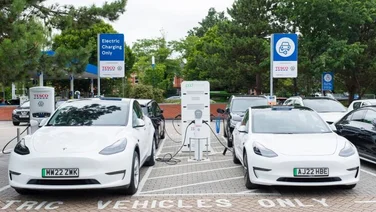- £6.6 billion worth of grants and loans to be made available for solar panel installation
- Government targets for the UK to be reliant on 95% clean electricity by 2030
- The government’s spending review concludes in June

Millions of homes could be offered £6.6 billion worth of grants and cheap loans to install low-carbon technology, including solar panels and heat pumps, as the government aims to reach its 2030 clean energy targets, according to reports.
Several media outlets, including the Times, reported near the end of 2024 that ministers are currently drawing up plans to subsidise the cost of installing solar panels and solar batteries in households.
There hasn’t been a formal policy announcement as of yet, but if there is more money for Warm Homes Plan it will be announced at the end of the government’s Spending Review, likely in July.
The Labour party manifesto promised to deliver energy security with the goal of zero-carbon electricity generation by the end of the decade, as well as cutting energy bills and creating jobs to accelerate the UK’s net zero drive.
In December 2024, Secretary of State for Energy and Climate Change, Ed Miliband, set out what was described as “the most ambitious reform to the energy system in generations,” with the goal of seeing the UK reliant on 95% clean electricity by 2030.
The initial commitment towards the Warm Homes Plan is £3.4 billion over the next three years. The government aims to upgrade 300,000 homes in the first year, which, if successful, will position the UK as a leader in clean energy and sustainable living.
A spokesperson for the Department for Energy Security and Net Zero was quoted in The Daily Telegraph saying that the Warm Homes plan will “ensure that new homes are fit for a net zero future, so people can generate their own electricity, cut their bills and at the same time help fight climate change.”
After the government’s spending review concludes in June, ministers will set out further plans on how solar energy can be supported in the UK.
The spokesperson continued: “We will set out our full plans to help millions more households benefit from clean homegrown power.
“We are considering the role that finance may play in supporting homeowners with the upfront costs of energy efficiency improvements, solar panels and installing low-carbon heating.”
Fuel-poor households will be given upfront grants to install solar panels and batteries and others could receive cheap loans to cover the cost of installation.
These loans would be repaid through bills at a lower cost than current household electricity charges, and would help consumers benefit directly from the decarbonisation of the national grid.
Jess Ralston, head of energy at the Energy and Climate Intelligence Unit (ECIU), was quoted describing the scheme as “a vital part of the government’s clean energy plan.”
Ministers are reportedly also considering increasing the profit homeowners could make by selling unused energy back to the grid. The current price is capped well below market levels, but increasing the amount would incentivise homeowners to sell.
However, there are fears that these plans could be too costly and not have the desired impact in solar uptake. Upgrades to the national grid would also be necessary as current infrastructure can’t handle and distribute power effectively.
Miliband said: “This is about harnessing the power of Britain’s natural resources to protect working people from the ravages of global energy markets.
“The clean power sprint is the national security, economic security, and social justice fight of our time.”






